
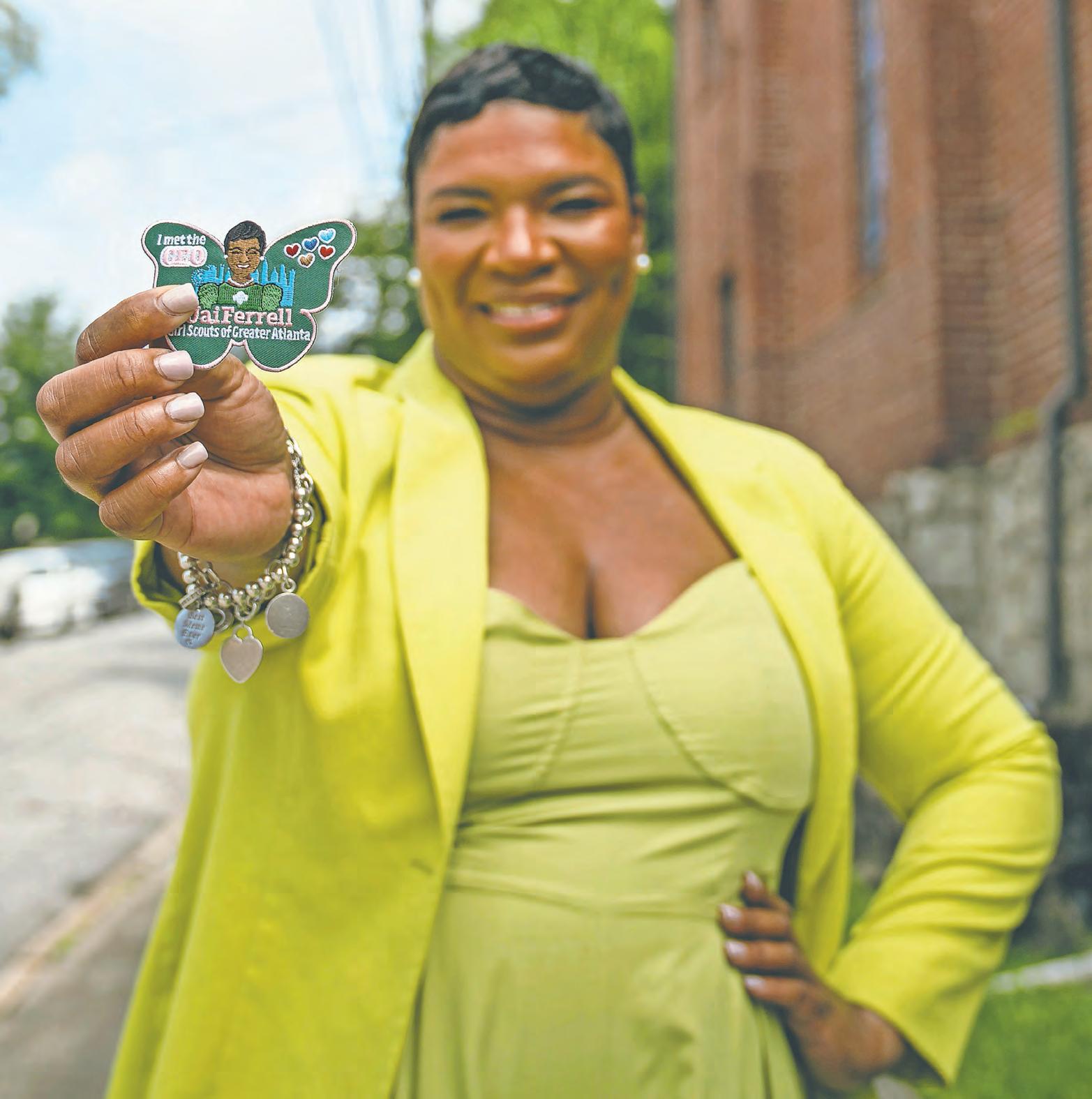



Jai Ferrell’s name is recognized across social spaces, from the inner-city communities of Atlanta to globally recognized C-suite offices. Before she would manage over $1.5 billion in revenue for the world’s busiest airport or break barriers as the first woman of color elected CEO of Girl Scouts of Greater Atlanta, she was simply Mookie—her childhood nickname. A little girl living on Columbia Drive, riding MARTA Bus 86 with her mother between school and work. Before she sparked a light in girls across the country, she first learned it from the woman who raised her. Ferrell’s story shows the power of a village and the unpredictability of life, both its highs and lows, but seeing through in the end.
The Foundation
On June 6, 1983, at Grady Hospital, Lolita Ferrell gave birth to her first and only child, J’Aimeka “Jai” Ferrell. The pregnancy had been unexpected for the teenage mother.
Lolita, a standout three-sport athlete at Southwest DeKalb High, didn’t realize she was pregnant until her ankles began to swell during basketball practice.
“At 16, I felt embarrassed, overwhelmed, and shocked—being 16 years old and pregnant,” she recalled.
Still, she pushed forward, finishing her junior season and graduating on time, determined to lay a solid foundation for her daughter’s future. From an early age, Jai’s charisma
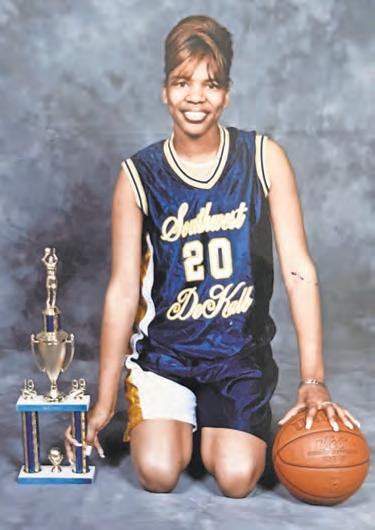
drew people in, her mother remembered.
“Jai was a unicorn… I knew she was going to be special. Raising Jai was a village effort,” Lolita said, crediting both her mother and herself with instilling life and love into Jai.
“I never felt like we struggled. I always had a room, a car when my friends got theirs—but now I understand the work it took to make that happen.”
While working multiple jobs, Lolita led by example.
“My mother was my first Girl Scout troop leader,” Jai said of her first troop meetings, which were held at Lindsay Street Baptist Church. Those early leadership lessons laid the blueprint for Jai’s future success.
As Jai got older, her mother’s athletic genes began to kick in, too.
“As a child, I could go out and play with the baddest of the boys. I was rough,” Jai said. “I was exposed to volleyball and golf in fourth and fifth grade.”
But basketball was her true passion.
“Basketball was my main sport. I tried track, but I don’t like running,” she laughed. “Then I got into basketball and realized I had to run anyway for conditioning.”
Standing six feet tall in high school, Jai played the power forward position on the same court her mother had played at Southwest DeKalb. Even her jersey number echoed her mom’s legacy.
“My mom wore number 20 in high school, so I wanted to wear it so badly,” she said. We actually had some of the same coaches, like Coach Dawson,” Jai recalled. “When he saw me in high school, he walked me and my mom over and said, ‘That’s the baby you had, huh? It was so weird.”
Basketball served as the glue that connected Jai’s village.
“Basketball was a focal point in our relationship—my mom’s, Jai’s, and mine,” said Lolita. Both her mother and grandmother were courtside at most of Jai’s high school and AAU games. Her grandmother even ran concessions at her high school games, earning the nickname “Grandma” from the team.
As a standout on the court, Jai received offers from several NCAA Division I programs.
“I was really good at basketball, so I had a scholarship to the University of Georgia. I also had offers from Furman, Florida International, and UAB.”
By her senior year, however, she knew she didn’t want to play basketball past high school.
“I knew I wasn’t playing basketball anymore. I tell you, the scene where Monica from Love and Basketball was running at
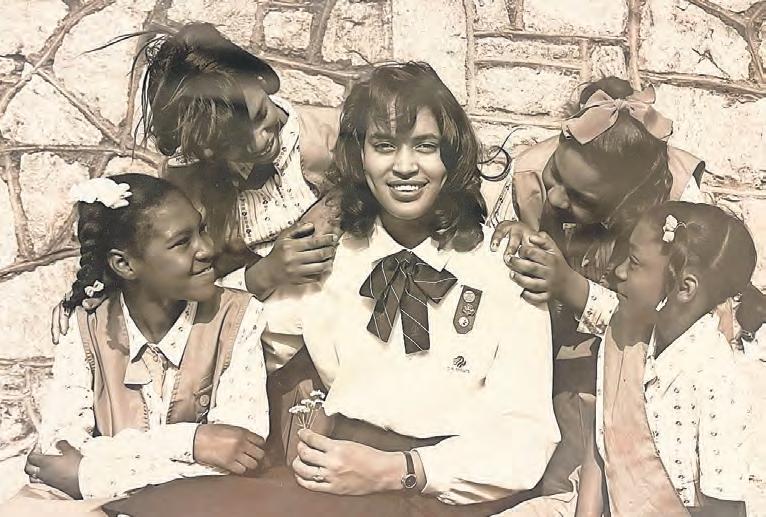
four o’clock in the morning—that did it for me,” she said jokingly.
In all seriousness, her certainty was largely influenced by the historic all-female school in the Atlanta University Center—a place she says changed her life.
Grandma’s Vision
“I remember growing up with my grandmother on English Avenue. Spelman was the school you wanted to be at,” Jai said.
From as early as she can remember, her mother and grandmother had envisioned her becoming a Spelman woman. When they passed the college on the way to church, they’d say, ‘There go your friends. That’s where y’all are going to the Morehouse games,’” Jai recalled.
By her senior year of high school, Jai’s choice of Spelman was her own, but it aligned with that vision. She remembered attending a program where she got to experience the day in the life of a Spelman student.
“That’s when I knew it was my school,” she said.
The honors student and Division I-scouted athlete applied to only one college, confident in her choice. “I had a poster that said, ‘Let her first step towards Spelman.’ I just knew it,” she reflected.
When she finally set foot on campus, Jai said it was enlightening. She was exposed to histories and social constructs about her Black identity through poets and writers like Sarah Bartman and Amiri Baraka.
But it was also humbling. “That was my first time really having to put forth effort.
And I think that did me good,” she said.
Originally, Jai aspired to be a screenwriter and producer for television—a contrast to her current career. But everything changed after meeting a professor, Paul Thomason.
“I’ve been teaching for about 45 years on the college level,” said Thomason. “She was one of those students who really stuck out to me… I knew she was going to go far.”
“We used to call him Mr. T. He’s probably one of the most brilliant men I know,” Jai added.
Under his tutelage, Jai learned theatrical production, but the lessons extended beyond
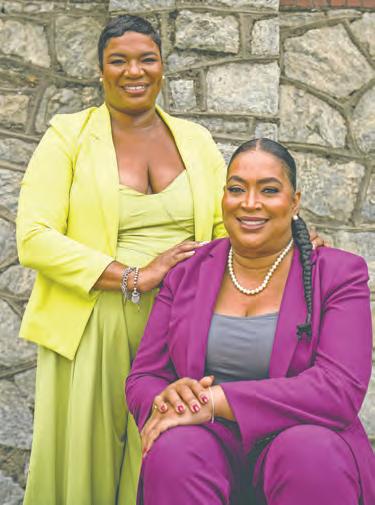
the stage. He taught her to use all her gifts and not limit herself to one aspect of theater.
Taking Mr. T’s advice, Jai began using her interpersonal skills to market plays at Spelman and Morehouse, creating press releases and fliers to promote the theater department—an experience that would benefit her later.
After graduating from Spelman in 2005, Jai began working for Turner Broadcasting, initially in image branding with names like Anderson Cooper and Hank Aaron. She eventually became Marketing Manager at Turner Broadcasting. For Jai, it was full circle—she remembered going with her mother to Turner Field in middle school, and now she held a respected role for the same company.
While working for Turner, she spearheaded and implemented new programs such as “Kids Run the Bases” at Braves games, a pregame DJ for fan experiences, and coverage of major events like Hurricane Katrina.
Everything changed in the fall of 2013. “I was laid off. I remember it was two days
See FERRELL on page 5
By ISAIAH SINGLETON
Renovations are set to begin this week on the historic O’Hern House, a 76-unit apartment building that serves formerly homeless individuals with permanent supportive housing.
O’Hern House serves residents typically diagnosed with dual challenges of severe and persistent mental illness (SPMI) and substance use disorders (SUDs).
The rehab will ensure the longevity and preservation of these critical affordable housing units in the heart of Atlanta, in the Historic Sweet Auburn neighborhood. Residents have recently moved to another apartment complex and are slated to return in the fall of 2026.
The rehab project timeline is expected to take 12 months to complete.
President and CEO of 3Keys, Inc., Scott Walker said residents, many of whom have experienced homelessness, deserve nothing less than the highest quality of care and support.
“The renovation of O’Hern House will make giving our residents the highest quality of care and support possible,” he said. “Through our mission-driven approach, 3Keys provides permanent supportive housing to those often considered the ‘hardest to serve.’ We are deeply grateful to our partners for joining us in this work to ensure our neighbors have the dignity, stability, and opportunities they all deserve.”
The renovation will include a complete reconfiguration of the first level and a refresh of residential rooms, along with new fixtures and furniture throughout the building. HVAC, electrical, plumbing and lighting systems will be upgraded with an eye towards energy efficiency. This will result in significant savings on power and water utility bills.
All on-site amenities will be upgraded, including the full-service industrial kitchen that provides three meals per day for the residents and the lounges and laundry rooms on the third and fourth floors.
More on-site features include an elevator, a game room, a library, and a community space for residents to engage in activities.
Councilmember Liliana Bakhtiari said O’Hern House has been a lifeline in the community for decades, and with the upcoming renovations, it recommits itself to decades more.
“Atlanta’s commitment to permanent supportive housing cannot be a passing moment; it has to be a lasting covenant. The team behind O’Hern House understands this responsibility, and this is yet another example of its promise,” she said.
Plans have been underway for more than a year and a half, with several partners collaborating on the plan to rehab the existing building:
• Development Partner: Quest CDC
• Architect: James Thomas Designs, LLC (Jim Viviano)
• Construction Project Manager: Carla Cooper
• Owner: The 3Keys, Inc.
• Support Service Provider: Community Friendship, Inc.
Additionally, 3Keys manages 477 permanent supportive housing units across six properties, where residents receive wraparound, individualized support on their paths to stability.
Through this holistic model, staff and partners offer a wide range of essential services, including case management, service coordination, peer support, life skills training, counseling, benefits help, transportation, food support, and referrals to local community providers. By combining affordable housing with healthcare and customized services, 3Keys helps residents overcome barriers and build a foundation for long-term success.
The impact is clear: 3Keys consistently supports a housing stability rate of 85% or higher, exceeding the U.S. Department of Housing and Urban Development’s (HUD) national benchmark of 80%.
With the renovation of O’Hern House, 3Keys is positioned to expand this impact, ensuring even more individuals have access to the housing, care, and resources they need to rebuild their lives with dignity and independence.
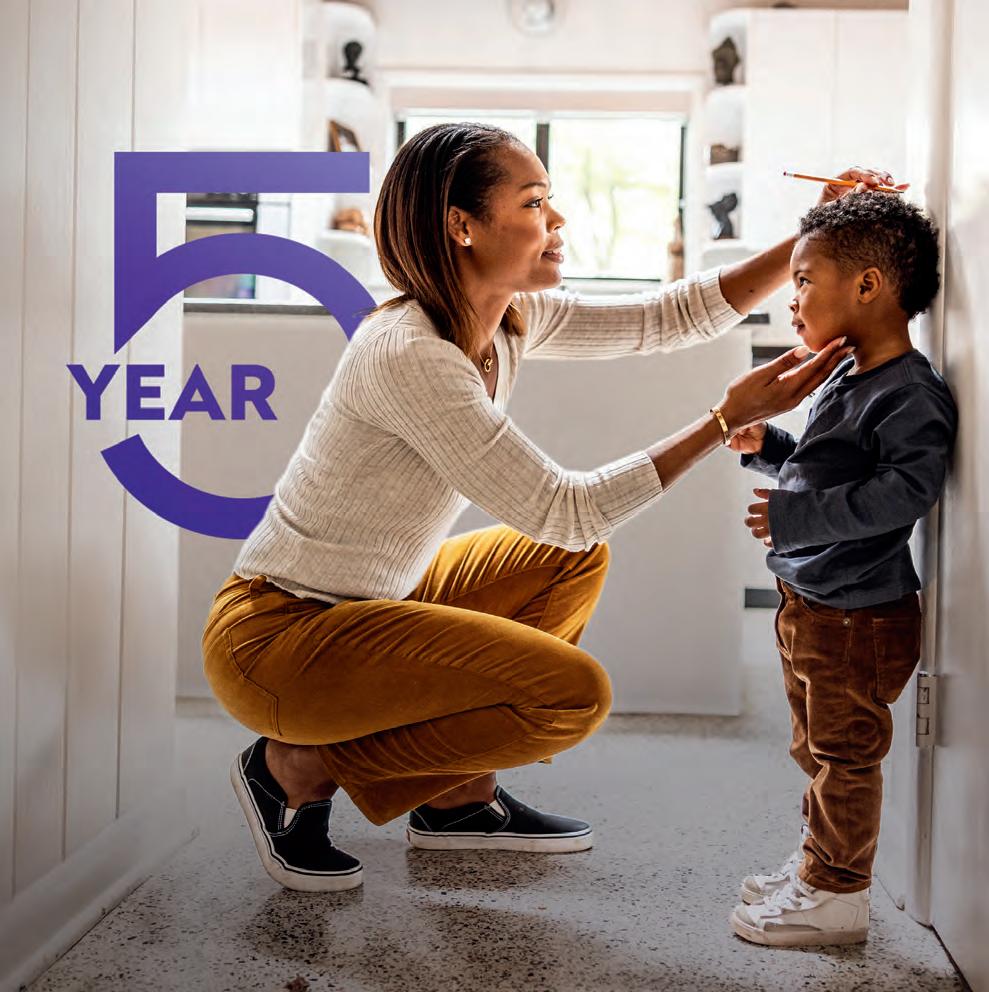

Renovations are set to begin this week
a

By DR. FRANCES “TONI” DRAPER AFRO CEO and Publisher
Iwas wrong. Not about the dangers of speaking up — I knew early that raising your voice could make you a target. I was wrong to believe that democracy would live up to its promise of protecting every voice, when racism was and is alive and well in the United States of America.
As a child of the civil rights era, I saw what happened to people who resisted. Leaders were jailed. Children were hosed and beaten. Students were dragged from lunch counters — images carried on television and printed in the AFRO that seared themselves into my young mind. Those pictures shaped an early understanding of justice, and they still matter today because the same forces of fear and silencing are at work in 2025.
I remember sitting quietly as my grandfather, Carl J. Murphy, longtime publisher of the AFRO-American Newspapers, spoke about the risks he faced because of his editorials. For 45 years, he used the AFRO’s pages to challenge segregation and demand equality — and for that courage, he endured FBI surveillance, harassment, and economic pressure designed to silence him.
Our family’s story is not unique. So many parents and grandparents bore the same scars. They faced threats, intimidation, job loss, surveillance, jail, and worse simply for demanding freedom. Their experiences remind us that free speech in America has never truly been free, especially for Black voices.
There was hope that democracy itself would provide sturdier guardrails, that over time the country would bend more toward openness rather than retreat into fear. But the events of 2025 — especially the killing of Charlie Kirk and the toxic aftermath — have shown how wrong that hope was.
Instead of grieving a life lost while also interrogating the harm of his rhetoric, Kirk’s death has been weaponized. It has become an excuse to silence those who dare to challenge his polarizing views. Nurses, teachers, journalists, students — people from every walk of life — have been punished simply for saying, “I do not agree.”
The hypocrisy is glaring. “Free speech” is defended for some, while others lose jobs, reputations, and platforms for speaking their truth. Even the press — the Fourth Estate, long regarded as democracy’s watchdog — is under unprecedented attack.
And yet, none of this is new.
Remembering Is Resistance
Colin Kaepernick knelt peacefully during the anthem and was exiled from professional football.
The Rev. Dr. Martin Luther King Jr. was branded a dangerous agitator before being assassinated for daring to dream aloud.

The Exonerated Five — Yusef Salaam, Antron McCray, Raymond Santana, Kevin Richardson, and Korey Wise — were just 14, 15, and 16-yearsold when they were wrongfully accused in the infamous Central Park jogger case. As boys, they were silenced and condemned; as men, they were vindicated. But the damage of that stolen youth can never be erased. And in Birmingham, four young girls — Addie Mae Collins, Denise McNair, Carole Robertson, and Cynthia Wesley — were murdered in their church before they ever had the chance to raise their voices. Their silence was imposed by hatred. Today’s cry to “say their names” reminds us that remembering is resistance, and silence is complicity.
The Lifeblood of Democracy
Here is the truth: hate speech and free speech are not the same. Free speech is the lifeblood of democracy. Hate speech is its poison — the words that demean, divide, and endanger. But in America, the two are too often confused, protecting the poison while punishing the truth-tellers. What are we teaching our children when we punish those who speak out against injustice while shielding those who spread division? What are we teaching when we say democracy values every voice, but prove through action that some voices matter less than others?
This is why today’s truth-tellers must be celebrated — journalists, grassroots organizers, young activists, pastors and preachers, and everyday citizens who refuse to be quiet. Young people, especially, are refusing to stay silent in the face of injustice. Their courage gives hope. They remind us that democracy doesn’t live in monuments or memorials. It lives in
the words and actions of ordinary people — often the young — who dare to speak when silence feels safer.
The boldness of prophetic leaders like the Rev. Dr. Jamal Harrison Bryant also deserves celebration, calling this nation to account in ways that stir both conscience and conviction. He stands in a long line of preachers, prophets, and organizers who never confused silence with safety.
But courage alone is not enough. This moment demands unity. The Black church, the Black Press, historic civil rights organizations, the Divine Nine Black fraternities and sororities, and all who love truth must reclaim a collective voice. Too many fought too hard for us to scatter now. With one message and one movement, we must again be the conscience of this nation.
What was taught about democracy was wrong. Democracy is not guaranteed. It is not self-sustaining. It does not automatically bend toward justice. It survives only when people — brave, ordinary, determined people — fight to protect it.
Many have been on the battlefield a long time, speaking and sacrificing with power and conviction. Others are raising their voices with fresh urgency. Together, we must stand as one. Their courage must become our collective rallying cry. They kept writing. They kept marching. They kept crusading for justice, in spite of great opposition. They refused to be silent, and so must we. If their witness endured persecution, then ours must endure the present storm. Their courage demands our courage. Their stand demands our stand. And this time, I know I’m right.
Frances “Toni” Draper is the publisher of the AFRO-American Newspaper (the AFRO), with offices in Baltimore, Maryland, and Washington, D.C.
FOUNDED May 11, 1966
FOUNDER/EDITOR
Ed Clayton
Immortalis Memoria
PUBLISHER/EDITOR
J. Lowell Ware
Immortalis Memoria
The Atlanta Voice honors the life of J. Lowell Ware.
PUBLISHER
Janis Ware
PRESIDENT/
GENERAL MANAGER
James A. Washington 2018-2024
EXECUTIVE ASSISTANT TO PUBLISHER
Chia Suggs csuggs@theatlantavoice.com
EDITOR IN CHIEF Donnell Suggs editor@theatlantavoice.com
GENERAL ASSIGNMENT REPORTERS
Isaiah Singleton isingleton@theatlantavoice.com
Laura Nwogu lnwogu@theatlantavoice.com
BUSINESS REPORTER
Tabius McCoy tmccoy@theatlantavoice.com
EDITOR AT LARGE Stan Washington swashington@theatlantavoice.com
ADVERTISING, SALES & CIRCULATION
ADVERTISING ADMINISTRATOR
Chia Suggs advertising@theatlantavoice.com
SALES
RDW Jackson
rdwadman@gmail.com
SUBMISSIONS editor@theatlantavoice.com
DIRECTOR OF PUBLIC RELATIONS
Martel Sharpe msharpe@theatlantavoice.com
CONTACT INFORMATION
633 Pryor Street, S.W. Atlanta, GA 30312
Office: 404-524-6426 info@theatlantavoice.com


By LAURA NWOGU
Downtown Decatur just got a little more vibrant. Roaring Social, a 1920s-themed speakeasy, celebrates its grand opening on Thursday, Sept. 18. Located on the corner of Ponce de Leon Avenue, the exterior of the building is unsuspecting. A sign hanging from the old bank welcomes people into a place called Roso Treasury, but behind the doors is a hidden world that transports you to the prohibition era, where secret passcodes were keys, dimly lit rooms were juxtaposed with lively music and exuberant dancing, and illegality was embraced in exchange for flowing drinks.
Roaring Social Decatur is the second location of the entertainment concept by Competitive Social Ventures, following its Alpharetta location, which opened in 2021. Neil Freeman, CEO of Competitive Social Ventures, said he knew Decatur would be the next perfect location for Roaring Social because it “checked every box.”
The concept features dueling pianos, craft cocktails and bitters, weekly live
Continued from page 2
before Halloween,” said Jai. “I was depressed. I was sad. I didn’t have a job, and I always had a job. Like, what was going on?”
It was a rough period. She went from being recognized as a success story—working for a major company with awards and recognition, her own office, and a “cool” job—to having all of it taken away, Jai explained.
“She started traveling on a dark road. We never thought something so traumatic would happen to her because she was always a winner,” said Jai’s mother.
Jai picked up odd marketing gigs, charging just enough to cover her car note and rent. Still, the money wasn’t enough. With her car close to repossession and struggling to pay rent, she found herself in unfamiliar territory.
“I was sitting in the parking lot of the labor and job office. I was at the unemployment office, and I was there with my nice BMW X5, featuring a Spelman sticker on the back and a tassel from my graduation. And all I kept saying was, ‘God, how did I get here?”
She went from spending frivolously on an upscale apartment and weekly dinners out, living off a six-figure salary, to surviving on $330 a week. At one point, she even considered moving back home.
At that time, her mother had just started working for the City of Atlanta. One day, while browsing the city’s job portal, she found two postings: Director of Aviation (DOA), Marketing Manager, and DOA Director of Marketing.
“I told Jai that she should apply,” her mother said.
entertainment, and mini pin bowling, the latter of which saw a surge of popularity during the prohibition era. Every corner of the speakeasy is a love letter to that moment in time, from the peninsular bar to the design of the bank and the framed pictures of the past lining the walls.
“The speakeasy had its heyday in the 1920s, but my goal in life is to create places where people can come together, create lifetime memories over food and beverage and music,” Freeman said. “It all kind of came together, and it’s been so much fun.”
Roaring Social Decatur is open from 5 p.m. to midnight on Tuesday through Thursday and 5 p.m. to 12:30 a.m. on Fridays and Saturdays. Tuesdays will feature live jazz, Wednesdays will feature music from rotating genres, Thursday nights will feature live band karaoke, and Fridays and Saturdays will have cover bands.
“I’m convinced it’s just going to be a great party every night. When they come through that vault door, I want them to leave their worries soak in the music, food, drink, and friends.”
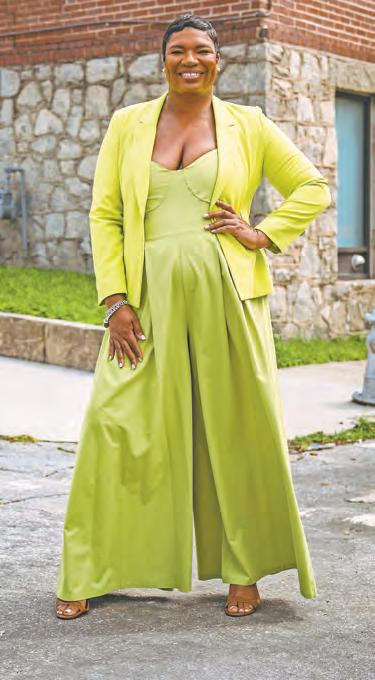
Jai Ferrell was motivated by everything from her mother to former professors to basketball to being laid off. “I make sure that I take my village with me in those rooms, because I am here because of the totality of everything,” she said. Photo by Tabius McCoy/The Atlanta Voice
“I don’t know anything about airports, like, I can’t do this job,” Jai remembered telling her, In June 2015, Jai stepped into the role of Marketing Manager at Hartsfield-Jackson Airport—and, as her mother put it, “the rest was her story.”

New Heights
At Hartsfield-Jackson, Jai rose from Marketing Manager to Chief Revenue Officer at just 32, managing a $1.5 billion budget and technological innovation for a space with over 100 million annual visitors. She navigated the COVID pandemic, Ebola, and Zika under three mayors.
“So that was my first time really understanding how to juggle so many things at once,” she said. Her tenure gave her opportunities to be in rooms she never imagined, travel the world with her mother, and cultivate her identity.
However, the role came with challenges. In many rooms and meetings, Jai was often the only Black woman present. Though that was an accomplishment, history shows that such responsibilities have too often been weighed down by constant misogynoir.
“And because I’m so dedicated to my people, a lot of times I would show up because I’m showing up for them… even though I’m probably being persecuted, I’m being attacked for all kinds of things,” said Jai.
To the public, Jai seemed unshakable, fearless, and unfazed. But in reality… she was not okay.
“A lot of times, you can do something to the point where you have now self-destruction… You start realizing I don’t even recognize myself anymore.”
During a routine doctor’s visit to address constant headaches—something she thought came with age—the doctor told her, “Whatever level of stress you have, you need to eliminate it now.”
“I was like, ‘But I feel fine,’” she recalled. “He said, ‘Most Black women do until they die.’ And that’s when I knew.”
Before the age of 40, Jai was living a life many would wish for. Yet her health was failing: her heart overworked, her blood pressure
elevated. It was simply too much.
With no job offer lined up and no clear next step, she made a decision. In April of 2024, after nearly a decade at Hartsfield-Jackson, Jai resigned.
She had realized the cost of her health wasn’t worth any career.
Jai Chi Era
A call came from Ebbie Parsons, cofounder of Diversified Search Group and Yardstick Management. The company’s mission was to place more women of color in senior leadership roles. He told Jai about a potential opening with “a local nonprofit,” without naming the organization.
At first, Jai didn’t think much of it, but she expressed interest. Weeks later, while sitting with her mother, she received a call inviting her to a panel interview. “And that was like God telling me,” Jai said.
Weeks after doing the panel interview, she received a call from Girl Scouts of America.
In June 2024, Jai Ferrell was appointed the first woman of color to serve as the Chief Executive Officer of Girl Scouts Greater Atlanta, which has been in existence for over 100 years.
“Everywhere we’re turning, we’re told that we’re not good enough, that we don’t belong, that this wasn’t for us, when, in fact, our ancestors’ tears and sweat are how this even came to be,” she said.
Despite the recognition, Jai remains grounded. Her daily playlist still includes Jeezy and Sounds of Blackness. Beneath the titles and accolades, the little girl from Atlanta, Mookie, still lives within her.
“I make sure that I take my village with me in those rooms, because I am here because of the totality of everything,” she said.
By DONNELL SUGGS
Former Georgia Lt. Governor Geoff Duncan came to The Atlanta Voice for the first time on Monday, Sept. 21, to discuss his campaign for governor. Duncan is one of nearly a dozen candidates who have launched campaigns this year. Last week, Duncan visited a Black-owned small business in what looked like a concerted effort to speak directly to Black voters. A former Republican, Duncan, is running as a Democrat and believes there’s a place for a governor who appeals to both sides.
“I do have a track record of working across the aisle,” he said. “I want to turn chaos into conversations.”
The Atlanta Voice: Good morning, Mr. Duncan, and welcome to WAREhouse Studios on the campus of The Atlanta Voice. Let’s get right to it. Why did you decide to run for governor?
Geoff Duncan: I really feel like Georgia’s best days are in front of us and I want to lead all Georgians to those better days. In my role as Lieutenant Governor I saw how important the job as governor can be. I really feel there’s an opportunity to prioritize folks in the state that need it the most.
Duncan listed affordable child care, unemployment, and housing cost, and healthcare as issues he plans to tackle during his campaign.
AV: Any other issues taking place in Georgia that you believe should be addressed on the campaign trail going forward?
GD: Quite honestly, we have a Donald Trump crisis, too. This guy has leaned into our state in such a negative way. Not only trying to steal the 2020 [presidential election], but now he’s essentially putting rural hospitals in a crisis. We have a Donald Trump crisis, and I am willing to stand up and push back.
AV: Does your experience as Lt. Governor give you an advantage over your opponents in this race?
GD: Absolutely. I learned a lot as Lt. Governor. In the four years that I was in office, we went through a pandemic, which was unbelievable for everybody ... .I don’t even know what to refer to the pandemic as. We woke up one day and there was 10 percent unemployment. We also
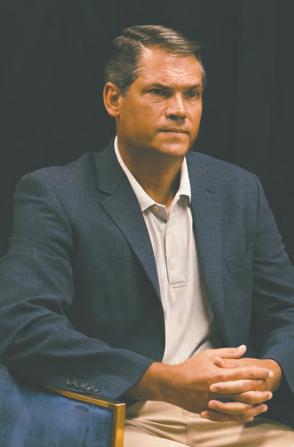
Kemp has been good for the state. “He is doing a good job of leading our state forward. Our economy continues to grow. I think he handled COVID extremely well, and I was glad to work alongside him and the Legislature on a number of the COVID relief actions. But there’s more work to be done in the state.”
AV: What do you believe you can bring to the governor’s office that the other candidates cannot?
GD: I have been behind the curtain, and I realize how important the job of governor is. You get to write the first draft of the budget. You get to prioritize what is going to be nearly $40 billion, understanding how those agencies work, and understanding what dollars are effective and what dollars don’t seem to be effective. You get to prioritize what’s going on in the Legislature as the chief negotiator between constituencies.
Democratic voters in two of Georgia’s largest counties, Fulton and DeKalb counties, respectively. Do you believe your level of name recognition will help you as well?
GD: I think more important than name recognition is my platform. I think my platform meets the needs, meets those individuals, meets those counties where they are.
AV: Please explain.
GD: I know I keep talking about affordability, but it’s a reality folks are facing. There are folks who are going to read this who are scared about just paying rent next month. They are worried about being able to afford groceries when they go to the store. My platform is laser-focused on meeting folks where they are at.
I think amongst Democrats my name ID is high because I have been willing to stand up to Donald Trump, even when it wasn’t politically popular.
AV: Why do you believe Democratic voters should trust you? Why should they believe you have similar Democratic values now?
GD: Those are great questions. Two parts: One is that I do have a track record of working across the aisle on an overwhelming majority of the issues. Two, some Republicans want to point fingers and call me names, saying ‘Geoff Duncan has lost his mind’. I haven’t lost my mind, I found my heart. I want to love my neighbor, that’s my mission each and every day. I want to look for ways to use the state of Georgia as that vehicle for us to love our neighbors.
Duncan, 50 married and a father of three, admitted that he “got guns and abortion wrong” as a “young Republican legislator.”
had to navigate the difficult realities of civil unrest and the horrific murder of Ahmaud Arbery, amongst others. And we had to deal with the 2020 election trying to be stolen by a sitting President. I learned a lot about leadership. I learned a lot about myself. I learned a lot about Georgians, and that’s really what’s led me on this journey. I think most Georgians just want somebody to lead their state that stays focussed on the issues that matter most.
AV: What are some of those issues?
GD: Being able to allow folks to raise their kids in safe communities, being able to have access to quality education and quality healthcare, the ability to find a high-paying quality job. Those are the things we want to stay focused on. Too often in politics, folks are staying focused on the fringe issues because it’s a hyper-partisan environment.
If Georgians want to elect somebody who’s going to be hyper-partisan and call names, then they are not going to vote for me. If they want a consistent leader who shows up to work every day focused on the issues that matter, I think we have a good shot to win this.
Duncan was clear that he believes current Georgia Governor Brian
And it’s not just Democrats versus Republicans at the Legislature. There are a lot of constituencies, rural and urban, and others, where you have to broker deals. The governor has to play a significant role. You put all that together, and the job of governor is important, and I feel like I have got a really good head start on understanding how that operates.
AV: Former Atlanta Mayor Keisha Lance Bottoms, State Rep. Jason Esteves, and former DeKalb County CEO Michael Thurmond are also running to represent the Democratic Party in this race. All have high levels of name recognition with
AV: Was the visit to The Black Coffee Company an attempt to begin reaching out to the Black voter base in Atlanta?
GD: One of my areas of focus has been on the Black community, for sure. Such an important part of the election, but more importantly, part of the state. The importance is to learn perspective, to understand what people need, where people’s hearts are at, and where their concerns are at.
On Sunday, Duncan and his wife attended service at Allen Temple AME Church, one of the city’s oldest Black church communities.
“I fell into that trap of thinking the NRA and other groups had people’s best interests at heart. They don’t,” he said.
He added, “I was wrong to think a room full of legislators knew better than millions of women in this state. I have taken the time to talk to them, hear their horrific stories, and tough circumstances in situations. I believe they deserve the right to choose and day one as governor, “I’ll sign an executive order that allows doctors to practice medicine with pregnant women without the fear of prosecution. Secondly, I’ll introduce legislation that repeals the six-week ban and returns us to Roe v Wade.
That’s my promise and I’m sticking to it.”

By TABIUS McCOy Report for America Corp
For a brief moment, the chatter was subdued as the sound waves dissolved into silence outside the VA clinic in Decatur. Faces in the crowd displayed empathy and sympathy, and some eyes glistened as Army Veteran Lamar Lyons shared a deeply personal reflection.
“Ten days ago I turned 68, but 30 years ago I didn’t think I would live to see 38,” Lyons said from the podium, wearing a t-shirt that read Fort Bragg Alumni. The former military switchboard operator and paratrooper served 26 years in the military. During some of those years, Lyons said he hit “a bottom he never thought he would recover from.”
On Wednesday morning, with dew drying from the grass and temperatures in the low 80s, veterans, VA staff, family members, and non-veterans gathered for the Atlanta VA’s 4th Suicide Prevention and Recovery Month Walk-N-Roll. The walk honors and raises awareness for national suicide prevention during April. In the United States, an average of 131 people die by suicide each day, and veterans account for roughly 17 of those deaths.
“It’s important for veterans to know they’re not alone,” said Chelle Lamb, suicide

prevention program manager at the Atlanta VA. Lamb co-started the event with her coworker Kajuana Pitts in 2022.
For veterans like Lyons, the event hit close to home. “I was 29 when I tried to take my own life for the first time,” he said. “I admitted myself to the VA system for suicide six times.” Growing up, Lyons said he was always told, “boys don’t cry,” which led him to suppress his feelings — a pattern that continued into his adult years and military service, fueling some of his darkest thoughts.
“Now I realize that when I suppress, it’s
going to end up becoming a mess. And that mess could end up taking my life,” Lyons said. He described grappling with perfectionism and a need to control every outcome in life, which often left him frustrated by the state of the world. At 68, Lyons said his perspective has changed, and he now proudly shares steps to help others avoid what he went through.
“If you see anybody who’s not themselves, sad all the time, or showing signs that something is off, please reach out and check in. You don’t need to be a medical professional,
but we need to try to connect before someone reaches a crisis,” Lyons said in his closing remarks.
Many veterans aren’t aware of the mental health resources the VA offers, explained Kai Mintzer, Executive Director of VA Atlanta Healthcare. “I am an Army veteran. I know other veterans who have harmed themselves or had thoughts of doing so. Most veterans don’t know the resources we have, and the list is long,” Mintzer said.
Currently, the VA provides veterans with support groups such as Alcoholics Anonymous and Narcotics Anonymous, as well as counseling and therapy services for those dealing with mental health concerns.
The event also serves non-veterans, Mintzer added, helping friends or family members understand how to support someone facing mental health challenges. “They say that for every suicide, 135 people are affected by it,” Mintzer said. “Today’s event is important because just sitting down with counselors or peers can help guide veterans through the challenges they’re facing.”
For veterans and non-veterans in a crisis, or for loved ones who know someone in crisis, it’s highly recommended to call 988 to speak with someone and get the help they need.
If you accepted or processed Discover credit cards between 2007–2023, you could be eligible to get a payment from a class action settlement.
To receive a payment, file a claim by May 18, 2026
A proposed class action settlement has been reached in three related lawsuits. The lawsuits allege that, beginning in 2007, Discover misclassified certain Discover-issued consumer credit cards as commercial credit cards, which in turn caused merchants and others to incur excessive interchange fees. The misclassification did not impact cardholders. Discover denies the claims in the lawsuits, and the Court has not decided who is right or wrong. Instead, the proposed settlement, if approved, will resolve the lawsuits and provide benefits to Settlement Class Members.
The Settlement Class includes all End Merchants, Merchant Acquirers, and Payment Intermediaries involved in processing or accepting a Misclassified Card Transaction during the period from January 1, 2007 through December 31, 2023. To view the full Settlement Class definition, including defined terms and excluded entities, go to www.DiscoverMerchantSettlement.com.
To receive a settlement payment, with very limited exceptions, you will need to file a claim by May 18, 2026 and/or provide additional information to the Settlement Administrator. Under the proposed settlement, Discover will make payments to
eligible Settlement Class Members who submit valid claims. Discover has agreed to pay between $540 million and $1.225 billion plus interest in connection with this settlement. Your settlement payment amount will be calculated based on a variety of factors.
You can file a claim for a payment by May 18, 2026 and/or provide additional information. Alternatively, you can exclude yourself from the settlement by opting out, in which case you will receive no payment under this settlement and retain any right you may have to sue Discover about the claims in these lawsuits or related to the Misclassified Card Transactions. If you do not exclude yourself, and the Court approves the settlement, you will be bound by the Court’s orders and judgments and will release any claims against Discover in these lawsuits or related to the Misclassified Card Transactions. If you do not exclude yourself, you can object to or comment on any part of the settlement. The deadline to either exclude yourself or object to the settlement is March 25, 2026. Visit the website for information on how to exercise these options.
By NOAH WASHINGTON
From the outside, Eagle Rock Skyland Studios looks like any other industrial warehouse on the edge of town. Inside, however, the cavernous space transforms into a polished Los Angeles law office, a judge’s chamber, and the tangled emotional landscape of Hulu’s Reasonable Doubt. On this particular Saturday, music blasted between takes, crew members hustled across the floor, and a script rework or two slipped into the pages; this was the rhythm of a show in full swing.
The Atlanta Voice spent the day with Ryan Richmond, 46, an Atlanta-based screenwriter for the Kerry Washington–produced TV drama Reasonable Doubt. On set alongside him was showrunner Raamla Mohamed, a veteran writer best known for her work on Scandal. At the center of the bustling production was Richmond, whose Atlanta roots make him something of an outlier in an industry pipeline that essentially runs through Los Angeles and New York. With Reasonable Doubt filming in Georgia, Richmond has found himself playing on home turf.
“When you find good talent, you don’t let it go to waste,” he said, smiling at the unlikeliness of his position.
Richmond didn’t come to television on the above-the-line side the usual way. He began
his career behind the camera doing belowthe-line work as a director of photography, which gave him a strong sense of how production flows. Writing episodic television, however, is new territory, one that has expanded his role from page to set.
“As the writer, the goal is to protect the creative vision,” he explained. “The showrunner can’t be everywhere at once, so we’re here to make sure every department has the information they need. You want each episode to have its own flavor, but it still has to fit within the story, like chapters in a book.”
That sense of consistency was important this day, as Episode 7, directed by Anton Cropper and guided by a script Richmond brought to set, came to life. It is a flashback-heavy chapter, one of the show’s signatures. “It’s not a whole dedicated flashback episode,” Richmond said, “but it’s peppered in so you get a sense of the history between Jax, her mom, and her dad. You see how it all came about.”
Even though the story takes place in Los Angeles, much of Reasonable Doubt is filmed in Georgia. The indoor scenes, courtrooms, homes, offices – can be built anywhere. The trick is making Atlanta stand in convincingly for LA. “Atlanta is great because you can get looks that pass for LA,” Richmond said. “We
still do exterior work in LA to ground it, but here you can cleverly pull off other cities. It’s always a little bit of faking.”
Even though Atlanta has become a powerhouse for film production, one piece of the industry often missing from the city is the sacred writers’ room, a long-running complaint within the local film community. Richmond managed to break through during the COVID-19 pandemic, when virtual writers’ rooms opened the door for talent outside Los Angeles and New York. For Atlanta writers, it was a rare win, though not without challenges. As the only Atlanta-based voice in the Reasonable Doubt writers’ room, Richmond navigated a space still firmly anchored on the coasts.
For him, that mix of authenticity and illusion mirrors his own journey. An Atlanta-based writer with national credits, he’s carving out space in a system that seldom makes room for Southern voices. And yet, here he is, guiding a multimillion-dollar Hulu production, fielding questions from directors, and ensuring every beat of dialogue stays true to the story.
As cameras rolled on the flashback sequence, Richmond stood just off set, script in hand, answering a quiet question from a crew member. It’s not glamorous, as
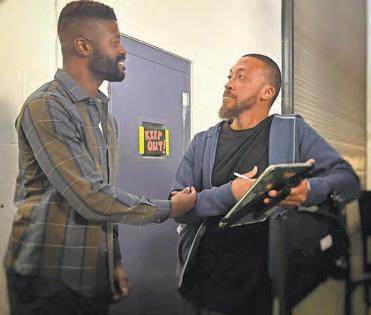
As the writer, the goal is to protect the creative
Showtime’s Californication or Apple TV’s
The Studio might make it seem. You are up early and often leave late but it’s essential. Ensuring the words on the page survive the translation to the screen. On this Saturday, as Atlanta once again doubled for Los Angeles, Richmond’s presence was both an anomaly and an advantage.
“It takes on a life of its own once it’s on its feet,” he said. “That’s the magic of it.”
The new season of Reasonable Doubt debuted on Hulu on September 18.
By DONNELL SUGGS
Drive a couple hours north of Atlanta into the North Georgia mountains and there are many awe-inspiring sights to see. From the gorgeous mountain views to the winding roads through small towns, you’re bound to witness God’s artistry at work. But up in the city of Rising Fawn is a resort that combines the beauty of North Georgia with the amenities of a first-class stay. For Atlantans, Cloudland at McLemore Resort might be the staycation destination you didn’t know you needed.
Cloudland at McLemore Resort is part of Hilton’s Curio Collection and since I have experienced stays at multiple Curio Collection properties in Georgia, I believe I can state that this is one of the best. Tucked away in a small town and far enough away from Atlanta’s traffic and congestion, Cloudland was the perfect weekend getaway. The fact that my family and I didn’t need to catch a flight or drive more than three hours to be at a resort, made the staycation even better.
Upon entering Cloudland, a library, open to all guests without an

opening or closing time, sits to the right of the lobby. Large with plenty of comfortable places to lounge, the library quickly became the place I rested every night of our stay. The library wasn’t just for show. There were copies of classic novels such as Ian Fleming’s “Goldfinger,” John Steinbeck’s “Grapes of Wrath,” and what library would be complete without F. Scott Fitzgerald’s “The Beautiful and Damned.”
“I think this sets the tone for the kind of resort we are,” LeAnn Johnson, the concierge, said.
Outside near the pool and heated jacuzzi, a fire pit helped keep guests warm on a cool night. The image of sitting by the fire pit or in one of the comfy love seats or rocking chairs stayed with me after I had gone upstairs to our room. One of the best parts of staying at Cloudland was that it wasn’t difficult to navigate the grounds. The fitness center (which includes a Peloton studio), library, and cafe (The Pocket, which offers guests complimentary cocktails from 5-7 p.m.), are all on the main level along with the lobby. The rooms
are very comfortable, and the view from our room on the fourth floor offered a look at the pool area below and the Georgia mountains above. The views alone are worth staying at Cloudland, seriously.
The spa, Selah, offers all of the comforts of full-service spas in Atlanta, but there was something peaceful about getting a massage in the mountains. My masseuse for the day, Anela, was wonderful and patient. After the one-hour massage, I felt light and rested. Anela said that was normal.
“It’s called massage-brain,” she joked. “One of the girls came up with that and I love it.”
She was right, I had massage-brain and it was wonderful. After the massage, I received a guided tour of the property from Johnson. Despite only having worked at the hotel since May, Johnson was well-versed in the ins and outs of the property, which opened for business in May 2024.
She and her husband live 10 minutes away and watched the project go from idea to 245-room luxury hotel and resort.
The on-site dining options make
a stay at Cloudland a one-stop stay. Cloudland has four restaurants: Auld Alliance, Croft, Skyside, and The Craig.
Dinner at Croft was excellent. The salmon was good, but the side of roasted mushrooms stole the show. There’s a fried cherry pie on the dessert menu that I would recommend to anyone who asks me. I might recommend it even if they don’t ask. Our server, Stephanie, recommended the pie be served with a scoop of vanilla ice cream. She was right, because the two paired perfectly.
Skyside, located next to the outdoor pool, offers a dining experience that offers guests an even closer look at the mountains.
“It’s like dining in a tree house,” Johnson said.
From interior designs, which include a large wooden topographical map of the North Georgia mountains, to large framed photographs done by local photographers, Cloudland at McLemore Resort is a wonderful getaway from the hustle and bustle of Atlanta. It’s within a couple of hours’ drive of the city, but a world away.
BY DENNIS MALCOLM BYRON AKA ALE SHARPTON
The midsize crossover market is crowded, but the three-row 2025
Mitsubishi Outlander SEL 2.5
S-AWC still finds a way to shine and stand out. This automaker does a masterful job of combining captive design, interior comfort, and practical versatility while maintaining a fair price starting at around $39K and $45K fully equipped with multiple options to make the most frugal smile.
Refined for 2025, my Outlander was dressed in a stealthy Moonstone Gray Metallic with a contrasting black roof to deliver an upscale presence upon sight. The 20-inch, two-tone alloy wheels; silver roof rails; spoiler; and futuristic LED lighting from nose to tail—including headlights, fog lights, and distinctive combination tail lamps—further raise its curb appeal.
Under the hood, a 2.5-liter DOHC 4-cylinder engine provides adequate pep with direct injection paired to an eight-speed continuously variable transmission (CVT) for a smoother ride. Mitsubishi’s Super All-Wheel Control (S-AWC) system, and multiple drive mode selector— Tarmac, Gravel, Snow, Normal, Eco, and Mud— boosts the confidence to handle whatever road conditions Mother Nature presents the drive.
I also appreciated the paddle shifters, and the shift-by-wire technology provided an escape from the normalcy of traditional gear shifters. The respectable 26 mpg combined (24 city/30 highway) provides some wallet relief with lesser trips to the gas station as well.
Inside, the SEL’s cabin feels more premium than its price suggests including all the extra packages. Semi-aniline leather-appointed seating with brick brown accents, ventilated front seats, and a heated leather-wrapped steering wheel provide generous comfort for especially long-distance excursions. More pilot perks include a 12-way power seat with memory linked
to the key fob, an updated 12.3-inch full digital driver display, 10.8-inch Head-Up Display, digital rearview mirror, and a 12-speaker Dynamic Sound Yamaha Ultimate sound system to elevate the driving experience. Wireless Apple CarPlay and Android Auto; navigation; and multiple USB-C ports keep every passenger powered up. Three-zone automatic climate control, panoramic sunroof, rear door sunshades, and even LED foot lighting collectively make the cabin even more pampering for up to seven people.
Safety is evidently a priority for Mitsubishi as well. Numerous features ease the mind including MI-PILOT Assist featuring Navi-link; adaptive cruise control with stop & go; lane keep and lane departure prevention; forward collision mitigation with pedestrian detection; blind spot warning with lane change assist, rear cross traffic alert; and rear automatic emergency braking. Multiple airbags—including front center and driver/passenger knee airbags—plus electronic stability control, hill start assist, and trailer stability assist make adventures especially to mountainous environs a welcomed option.
Ownership benefits sweeten the deal, including a 10-year/100,000-mile powertrain warranty, five years of unlimited-mile roadside assistance, and two years of complimentary maintenance. I’m not mad at that reassurance.
SUN, OCT 5TH from 12 to 6PM
Come experience Atlanta’s biggest block party on Howell Mill Road.

Overall, the Mitsubishi Outlander SEL 2.5 S-AWC delivers with its 2025 upgrades in numerous departments, including design and technology. So whether it’s bobbing and weaving through the city or feeling adventurous for a long excursion, this SUV steps up to the plate.
Fuel Economy: 24 city/30 highway/26 combined
Price: Starts at $38,795 (MSRP); reviewed in the SEL trim and including $3,050 Premium Package; $1,400 Launch Package, and destination is $45,930.
For more information, visit Mitsubishicars.com









MAKER’S MARKET
By NOAH WASHINGTON
Anew exhibition at the Auburn Avenue Research Library on African American Culture and History seeks to rewrite the narrative of Black womanhood by reclaiming the idea of softness. Softness Was Always Ours, curated by project archivist Jami Adkins Murphy, debuted on Thursday, Sept. 18.
The exhibition draws heavily from the Ellie Lee Weems Photographic Negatives Collection (1928–1978), featuring over 100 digitized photographs, mounted prints, books, record covers, and rare periodicals. The images span five decades, capturing Black women and girls in moments of childhood, adolescence, and adulthood.
“Black women are often stereotyped as angry, bitter, or unprofessional, but history shows us the exact opposite,” Murphy said. “These images show Black women in moments of resilience, elegance, and joy. I wanted to lift that up at a time when so many are feeling exhausted or unseen.”
This exhibit comes at a time when Black women are being pushed out of the workforce after a reported job loss of 300,000, as reported by Forbes. The pressures of systemic bias, burnout, and constant expectations of strength have left many without the space to rest or be vulnerable.
Library administrator Victor E. Simmons Jr. described the project as a collective effort to transform the library’s second-floor gallery into a space dedicated to in-house exhibitions. “We wanted to highlight Black women not only as strong, but also as soft, caring, and loving, parts of their lives rarely celebrated in media,” Simmons said. He noted that while mainstream portrayals often reduce Black women to stereotypes of toughness, the exhibition’s images, from mothers at cotillions to women captured in moments of quiet study, reveal tenderness and dignity as just as central to their stories. For Simmons, the show is not only about countering negative imagery, but also about honoring the fullness of Black family and community life, echoing memories of his own upbringing.
Beyond the photographs, Softness Was Always Ours highlights how cultural institutions and publications affirmed Black womanhood when mainstream outlets did not. A panel on Black print media features covers and spreads from magazines such as Ebony, Jet, Hue, Color, and Candid. From the late 1930s through the 1970s, these periodicals placed Black women at the center, celebrating their beauty, grace, and style during a time when such representation was rare.
“These magazines created space for glamour and tenderness,” Murphy said. “They showed young Black girls that refinement and admiration were not reserved for others; they were always ours.”
Another section of the exhibition focuses on

the Utopian Literary Club, founded in Atlanta in 1916. Composed of professors, attorneys, scientists, and businesswomen, members met to engage with scholarly literature, the arts, and philanthropy.
“The Utopian Literary Club represents an important message,” Murphy said. “Being academic doesn’t mean you lack softness, and being soft doesn’t mean you lack intellect.”
Artifacts from the club, including photographs, papers, and ephemera, highlight a tradition of elegance and intellectual fire that shaped Atlanta’s cultural life.
Murphy emphasized that the exhibition challenges one-dimensional portrayals of Black women in popular culture. “If all people know of Black women is the erotic side, they miss out on the elegance, the glamour, the grace, and the culture,” she said. By presenting images that range from swimsuits to evening gowns, opera dresses, military and band uniforms, and even fur coats, Softness Was Always Ours aims to show that Black women are never just one thing; they embody complexity, versatility, and dignity across every facet of life.
Murphy said she hopes visitors leave with a renewed sense of affirmation. “I want people to take away that Black women are beautiful, that Black women are loved, that Black women have value, and that Black women are worthy of joy.”
Softness Was Always Ours opened with a public reception on Thursday, Sept. 18, at the Auburn Avenue Research Library’s second-floor gallery.
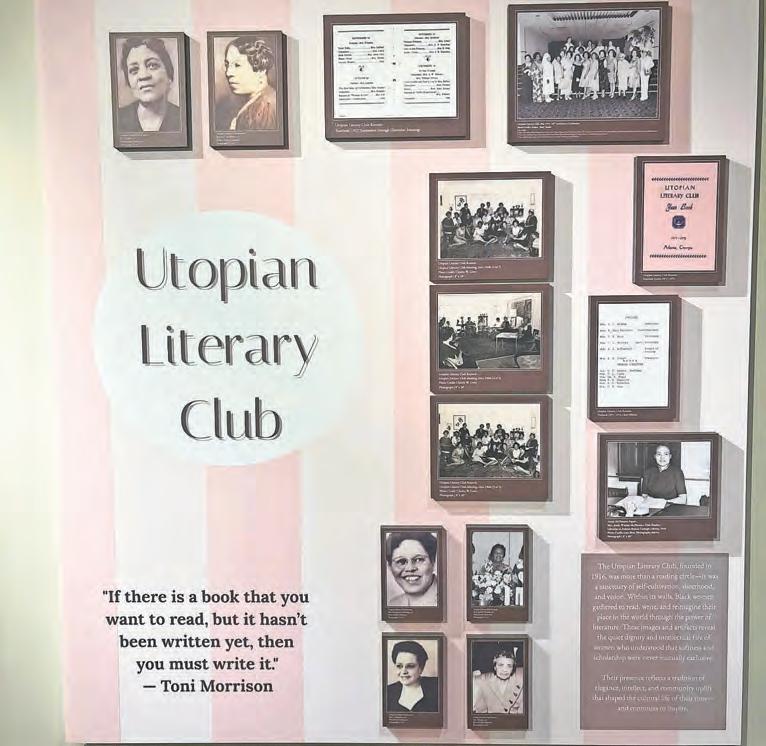
By DONNELL SUGGS
According to data from the Georgia Council on Literacy, third and fourth grade reading levels within the state are below 70%, with 68% of fourth-graders and 62% of third-graders not reading at a proficient level. Access to reading materials, during the school year and during the multiple holiday breaks and summers, can help raise those levels.
Books as far as the eye could see were on display on Tuesday morning as the Bijan Reads book fair took place on the Mercedes-Benz Stadium playing surface. An initiative from the Bijan Robinson Foundation, Bijan Reads is attempting to make a positive impact on reading through fun events like the book fair taking place on Tuesday.
Robinson, who admitted that he had issues with enjoying reading as a kid, said he was looking forward to hearing the kids’ stories about what they enjoy about reading. A native of Tuscon, Arizona, he told The Atlanta Voice that one day he realized he shouldn’t care what anyone else thought about how he reads, he just wanted to start doing it more.
“I knew I was trying to better myself and I didn’t care who judged me,” Robinson, dressed in a black “Bijan Reads” t-shirt and matching sweats, said during a press gathering before the book fair began.

“I have such a big heart for kids,” he said. “I believe God put me on this Earth to inspire kids.”
Along with sponsors like Scholastic, Atlanta Public Schools, the Alliance Theater, and the Rollins Center for Language & Learning, the Bijan Reads book fair allowed the elementary school students to get out of the classroom for a few hours and head downtown to hear from one of the city’s most popular professional athletes.
Through three games this season, Robinson has rushed for 239 yards on 47 carries, and has 14 receptions for 164 yards and a touchdown. The Falcons, 1-2 this season, will host the Washington Commanders on Sunday afternoon. The stands will be packed for the second home game of the season, but on Tuesday, the stands were packed with students waiting to get bags filled with books.
Students from area elementary schools such as Boyd, Kimberly, Perkerson, Continental Colony, Garden Hills, Tuskegee Airmen Global Academy, Toomer, and
His advice to a kid struggling with reading is simple: “Just pick up a book,” he said. “Just pick up a hardcover book, or any book. You have to start somewhere.”
Brandon, were jumping off of school buses and heading into Mercedes-Benz Stadium to hear Robinson talk about the importance of reading.
Robinson said the event was life-changing for him and that he hopes it changes the lives of the kids that were attending.
Dozens of volunteers, also wearing Bijan Reads t-shirts, lime green ones to better be seen for assistance amongst the thousands of kids and teachers, were packing clear bags with Clifford the Big Red Dog books, books from the Captain Underpants series, and copies of “Be You” by Peter H. Reynolds. The book fair bags will also include pencils, pens, stickers, and copies of Bijan Reads literacy guide.
“It changed my life,” said Robinson of reading. “This moment is bigger than everything.”
By DONNELL SUGGS
Atlanta Braves rookie catcher Drake Badwin may have begun the 2025 season platooning behind the plate, but he will finish it as one of the frontrunners for National League Rookie of the Year. Baldwin came into Monday night’s game against the Washington Nationals batting .273 with 18 home runs, 76 RBI, 52 runs scored, and a .799 OPS. Even though the Braves will end the season out of the National League postseason picture and under .500, Baldwin’s offensive input and defense behind the dish have been important whatever success the club has had this season.
Over the past 30 games coming into Monday night, Baldwin’s numbers were down (.245 from the plate with 11 strikeouts), but he has picked them up of late. During the past seven games, all Braves victories, Baldwin is hitting .348 with a .738 slugging percentage, two home runs, and eight runs batted in. His only true competition for the award is a young starter on the Northside of Chicago.
The Chicago Cubs’ starting pitcher, Cade Horton, has been lighting up National League hitters this season. Horton is currently 11-4
with a 2.66 ERA, 95 strikeouts, and has only given up 33 walks in 115 innings.
Against the Braves this season, Horton is 1-0 in two starts. During those games, he had an ERA of 0.79 in 11 innings of work and struck out eight Braves while only giving up one earned run.
It wouldn’t be an upset if Horton won the award, but Baldwin has made a solid case this season. The Braves finishing under .500 could be why Baldwin doesn’t come away with it. The Cubs (88-68 overall) are currently atop the National League wild card standings. That makes Horton’s 11 victories this season that much more important.
On Monday night, with the bases loaded and the Braves ahead 2-1, Baldwin, batting in the sixth slot in the lineup, hit a two-RBI single off Nationals pitcher Jackson Rutledge to extend the Braves’ lead to 3-1. The two runs left Baldwin with the third most runs batted in on the team behind Matt Olson (93) and Michael Harris (80).
Baldwin hit a double in the fourth inning, his 17th of the season. That hit started a rally that ended with Atlanta scoring another run on Harris’s third RBI of the game.



(404) 586-9098



Wahoo Fitness, L.L.C. has opening in Atlanta, GA for Test Engineer. Conduct comprehensive software, hardware, & exploratory testing to validate performance & functionality. Bach or equiv + 3yrs exp. Travel req 4x/yr to China, Taiwan, & other locs as req. Send resumes to Wahoo Fitness, L.L.C., Attn: Mike Ragan, 90 W Wieuca Rd NE, Ste 110, Atlanta, GA 30342. Must ref job title & code: TE-JH.


















































SUMMONS BY PUBLICATION, CARE AND PROTECTION, TERMINATION OF PARENTAL RIGHTS, DOCKET NUMBER24CP0219SP, Trial Court of Massachusetts, Juvenile Court Department, COMMONWEALTH OF MASSACHUSETTS, Hampden County Juvenile Court, 80 State Street, Springfield, MA 01103. 413-748-7714. TO: The father of Carly Farrah Eli, born on 09/09/2013 in Atlanta, GA to Peaches Eli: A petition has been presented to this court by Department of Children & Families Springfield, seeking, as to the following child: Carly Farrah Eli, that said child be found in need of care and protection and committed to the Department of Children and Families. The court may dispense the rights of the person(s) named herein to receive notice of or to consent to any legal proceeding affecting the adoption, custody, or guardianship or any other disposition of the child named herein, if it finds that the child is in need of care and protection and that the best interests of the child would be served by said disposition. You are hereby ORDERED to appear in this court, at the court address set forth above, on the following date and time: 10/27/2025 at 09:00 AM Permanency Hearing You may bring an attorney with you. If you have a right to an attorney and if the court determines that you are indigent, the court will appoint an attorney to represent you. If you fail to appear, the court may proceed on that date and any date thereafter to a trial on the merits and adjudication of this matter. For further information call the Office of the Clerk-Magistrate at 413-322-6700.WITNESS: Hon. David B. Paradis, FIRST JUSTICE, DATE ISSUED: 09/04/2025, Paul R Viets, Clerk-Magistrate.







